by Ivary & Paola | Mar 15, 2019 | In The Loop
La Lectura
• Determine or clarify the meaning of unknown and multiple-meaning words and phrases.
• Demonstrate understanding of figurative language, word relationships, and nuances in word meanings.
• Determine a central idea of a text and how it is conveyed through particular details; provide a summary of the text distinct from personal opinions or judgments.
• Trace and evaluate the argument and specific claims in a text, distinguishing claims that are supported by reasons and evidence from claims that are not.
• Describe how a particular story’s or drama’s plot unfolds in a series of episodes as well as how the characters respond or change as the plot moves toward a resolution.
• Engage and orient the reader by establishing a context and introducing a narrator and/or characters; organize an event sequence that unfolds naturally and logically.
• Understand the use of possessive pronouns.
• Spell word with x.
Dear families, in an attempt to help students with their Spanish reading at home (I have noticed students have been lacking Spanish reading practice!), and reinforce some of the concepts seen in class, students will be bringing Spanish reading homework packets every Monday. It is their responsibility to turn in their homework on Friday. Please make sure that your child has a consistent daily reading routine in Spanish of at least 15 minutes every night. I always remind the importance of practice, in order to achieve advanced levels of accuracy in their second language. Thank you for your continued support!
Ciencias
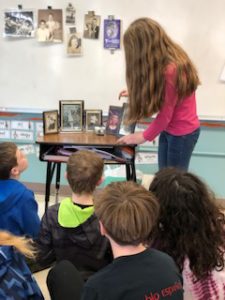 During this investigation, students investigate the underlying mechanisms of change in population. They learn how organisms inherit traits from their parents and how dominant and recessive alleles interact to produce traits in a population. Some of the big concepts we will see during this investigation are:
During this investigation, students investigate the underlying mechanisms of change in population. They learn how organisms inherit traits from their parents and how dominant and recessive alleles interact to produce traits in a population. Some of the big concepts we will see during this investigation are:
• Heredity is the passing of information from one generation to the next.
• Chromosomes are structures that contain hereditary information and transfer it to the next generation; they occur in nearly identical pairs in the nucleus of every cell.
• Genes are the basic units of heredity carried by chromosomes
This week, students looked at four of their features to determine what trait they have: little fingers straight or bent, earlobes attached or not, hairline forms a widow’s peak or not, and tongue can curl or not. They determined the distribution of the four traits in the class. Students then studied a population of larkeys, a make-believe animal, to analyze their traits.
Students are encouraged to bring some family photographs to share with the class!
Mathematics
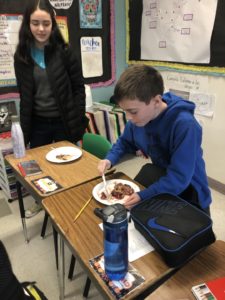
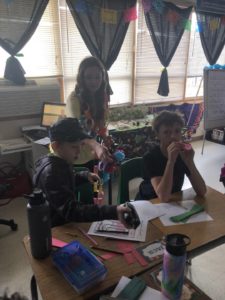 This week we learned about pi!
This week we learned about pi!
- We listened to 100 digits of pi song
- We also figured out how to use it in fraction and decimal form to calculate circumference and area.
- The equation for area is πr2
- The equation for circumference is πd
(Written by:Evan)
History & Geography
This week we learned about Napoleon and his role in the French Revolution.
- We talked about how Napoleon Bonaparte changed France after the Reign of Terror.
- We discussed his successes in France and his downfall
- We read journal entries by a Napoleonic soldier.
English Writing & Spelling
In writing this week we continued working on our argumentative writing piece.
- We added titles to our argumentative writing.
- We exchanged words in our writing.
In Greek and Latin Roots this week we
- Finished our greek and latin roots packet (Bi, du, amphi/ambi) which means two, or both.
(Written by: Tamra)
by Sarah Segall | Mar 15, 2019 | In The Loop
History & Geography
Our weekly objectives were to:
- Understand the events of the French and Indian War.
- Identify the provisions of the peace treaty between the British and the French.
- Understand the implications of the war´s outcome for Britain and the American colonies.
- Understand the colonial policies Britain made as a result of the French and Indian War, including the Proclamation of 1763.
- Understand the effects of these policies on the American colonies.
- Understand the Stamp Act.
- Explain how the colonists organized themselves to protest the Stamp Act.
Mathematics w/Laura
Week of March 11, 2019 – March 15, 2019
The week of π Day (Pi Day) — irrationally good!!!
- Each student made his/her slice of our pie (Pi),
as we displayed them in the hall.
- Teams of students measured the circumferences and diameters
of 16 different sized circles to find the value of pi.
- Each student made a wearable piece of pi art!
- Teams of students plotted the frequency of the
digits 0 through 9 in the first 200+ digits of pi, poster in the hall.
- Of course, we sang The Pi Song and ate pie!
Puzzles available for extra credit and Friday (Math) Bingo
Remember: MATH …. It’s everywhere
La lectura
This week we began our new unit: Medicine from long ago and medicine today. This unit really shows the scientific process and highlights the importance of good record keeping! We can use these great examples to help us with our science experiments.
We have now started a verb race activity in which the students will have 4 minutes to conjugate a verb correctly 30 times, using the subjects and the tense given. This is just drill practice but reinforces our verb study and will help them in their writing.
There was no new spelling list this week.
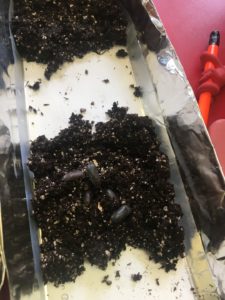
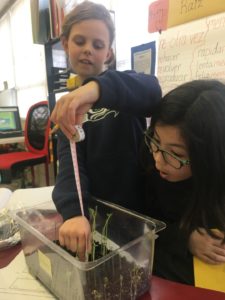
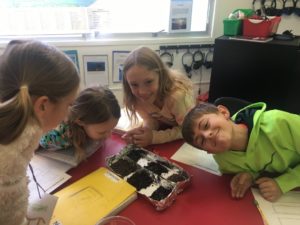
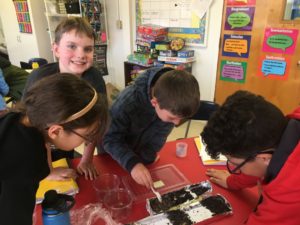
Ciencias
This week we continued observing our terrariums, making adjustments to the environment and recording all changes. We also began our second Environments investigation: Bugs and Beetles. In this investigation students will:
- Investigate how moisture affects isopod and beetle behavior.
- Organize and analyze data from animal investigations.
- Determine an organism´s environmental preferences for various environmental factors (moisture this week).
- Use scientific thinking processes to conduct investigations and build explanations: observing, communicating, comparing, organizing, and relating.
by Jill & Sarah | Mar 15, 2019 | In The Loop
History & Geography
This week we read more about America at War in 1812, including naval battles against the British and failed attempts to invade Canada. We read the “Star-Spangled Banner” and analyzed Key’s poem in regards to what he was experiencing during the battle at Fort McHenry.
Our weekly objectives were to:
• Understand the story of Francis Scott Key and the “Star Spangled Banner”
• Identify American Naval victories and defeats
• Explain why the Battle of New Orleans was fought after the signing of the Treaty of Ghent
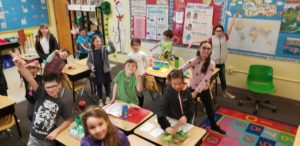 Science
Science
We worked hard this week putting our speeches together for our insect reports. On Thursday the class did a great job presenting their models and doing their speeches. Everyone should be proud of themselves for their efforts. We will take our Insect domain assessment next Monday.
Our weekly objectives were to:
• Write a speech based on the research gathered from the insect report.
• Edit and revise the speech
• Practice reading the speech with a partner
• Present the speech to the class and describe how your model was made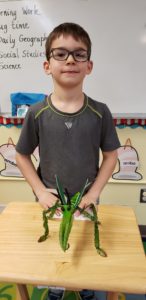
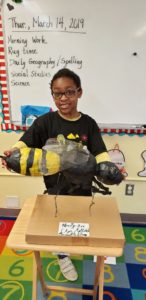
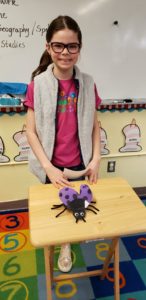
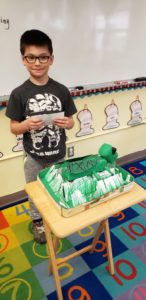
Spelling and Writing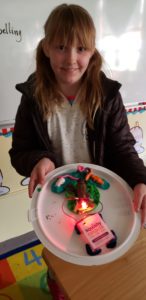
In our journals we used the idiom of the week ” he is a barrel of laughs ” . The class worked on two spelling assignments and took their final spelling test on Friday. Our Word Wall words were: shook, sometimes, short.
La lectura
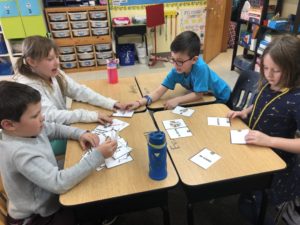
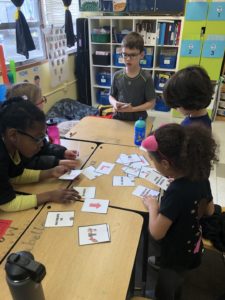 This week we read De donde saco sus manchas la gallina de guinea.
This week we read De donde saco sus manchas la gallina de guinea.
Our weekly objectives were to:
- we focused on making connections and predictions during our first read
- during our second read we worked on drawing conclusions throughout the story
- learn a poem about prepositional words then we played a prepositional word matching game
Students also brought home instructions for the Spanish Animal Reports. If you have any questions please let me know!
Las matemáticas
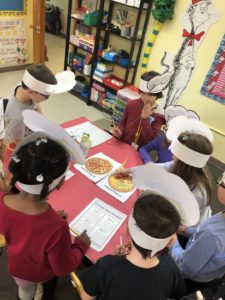
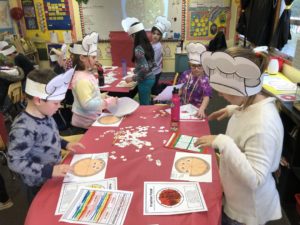 This week we learned about fractions!
This week we learned about fractions!
Our weekly objectives were to:
- identify fractions that name more than one equal part of a whole
- use models to add and subtract fractions
- add and subtract like fractions
- review our objectives by working in Ms.Ivary´s pizza kitchen!
by Sarah Segall | Mar 15, 2019 | In The Loop
La lectura
This week we began our new Rojo, blanco y negro language arts unit. We are learning about patriotism and what makes a good citizen. We talk about what makes a good citizen within our classroom and within our school, working together and listening to each other are key!
Students also impressed me with their use of Spanish this week! Someone flipped the switch and they all were using great sentences and asking and answering questions in Spanish.
In writing we moved beyond everyone copying a prompt from the board to them ‘dictating’ their own sentence. They had to form their own sentence and then stretch it out while writing (so they could hear all the sounds from the words they wanted to write). They did an amazing job! I was so proud of this milestone!!
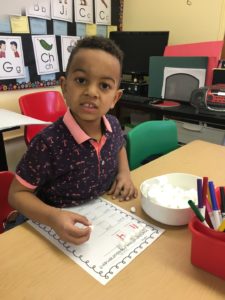
Measuring with two sizes of marshmallows.
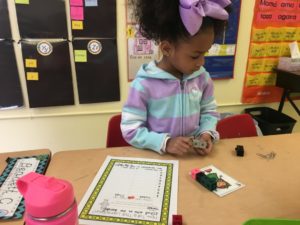
Using cubes and big paper clips to measure leprechauns.
Las matemáticas
We had so much fun exploring our measurement unit this week! We also started our estimation jar (always a favorite!). Each week a student will bring the estimation jar home of Friday and should pick like items (same size legos, same size cars, same size dolls, same size gold fish, etc). Students will estimate how many items they think are in the jar. Then we will fill a small clear cup with those items, count how many fit in there, and then make a second estimation. Please do NOT have your child count how many items they put in! Also, there are clear instructions that will come home with the estimation jar but DO NOT put it in the dishwasher!!
Major was the first one to take the jar home. We can’t wait to make our estimations on Monday!!
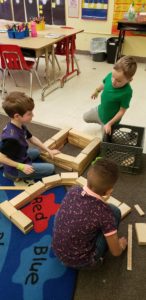
Bricklayers
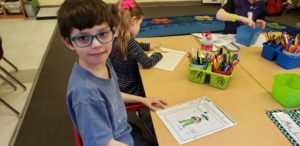 History & Geography
History & Geography
This week in Colonial trades people, we learned about the house builders: masons, bricklayers, and carpenters. We talked about the meaning of the sayings “Measure twice, cut once” and “Better safe than sorry”. On Thursday the class acted out some of the trades we have recently read about. This week we began working on daily geography skills, we will be learning how to read and create maps, answer questions, analyze graphic information, and make connections to ourselves. Look for our finished practice work in the take home folders.
Our weekly objectives were to:
• describe the bricklayer, mason, and carpenter in a colonial town
• identify, and associate with the appropriate trade, the tools used by the people we have learned about
Science
This week in our Taking Care of the Earth domain we learned about pollution. We discussed the different kinds of pollution and how it affects our world. On Thursday we did a demonstration of air pollution. We read a trade book about taking care of the Earth.
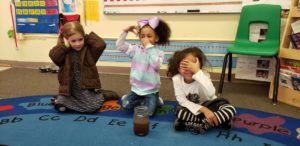
Water pollution is not good!
Our weekly objectives were to:
• understand that land, air, and water all suffer from different types of pollution, and all types of pollution are caused by human activities.
• understand that if people are careful and creative, they can help reduce pollution
by Sarah Segall | Mar 11, 2019 | In The Loop
We are offering 10 different summer camps this year!
Please check out our Summer Camps page for more information.
Summer Camps
SWS 2019 Summer Camp Application
by Ivary & Paola | Mar 8, 2019 | In The Loop
La Lectura
This week we not only celebrated the joy of reading with Dr. Seuss’ fun filled activities, but also the joy of writing. Students got to share with the class their argumentative writing pieces they worked so hard on. We also continued with our regular literacy routines leaning about idiomatic expressions and spelling words with letters not found in the English language! Ask your child about this. They also learned about the difference between demonstrative pronouns and adjectives. To end our week, we read the biography of a very influential woman in Latin America, Frida Kahlo, the challenges she had to face throughout her life and the significant contributions to art. All in all, we had a full week!
Ciencias
Some of the moments captured during our Presentaciones de Ciencias: Adaptaciones.
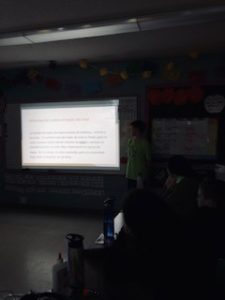
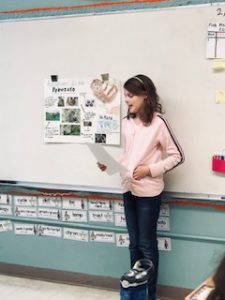

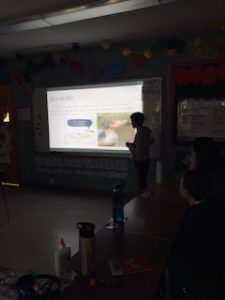
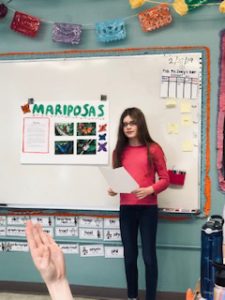
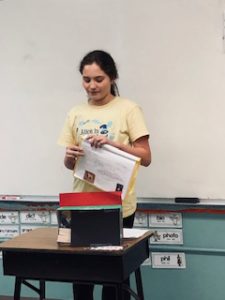
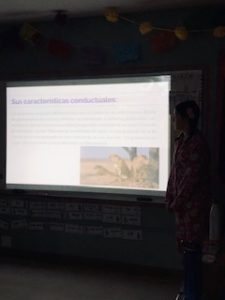
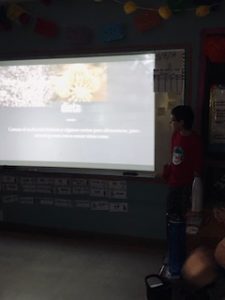
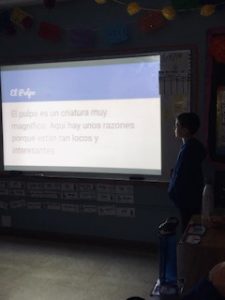
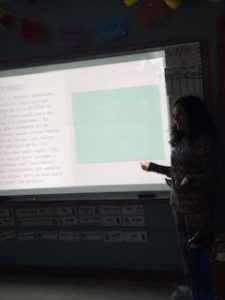
Mathematics
This week we learned about algebraic inequalities.
-
- We learned about how to correctly do real world problems.
- We got a little deeper in algebraic inequalities, and expressions.
- We also had our Chapter 8. math test.
(Written by: Juliette Murrow)
History & Geography
This week we learned about the Scarlet Pimpernel.
- We watched/talked about a clip from The Scarlet Pimpernel
- We learned that he saved nobles from the guillotine
- He was loathed by revolutionary leaders
(Written by:Rafa L. )
English Writing & Spelling
In writing this week we continued working on our argumentative writing piece.
- We also began exchanging words for better, more descriptive ones.
(Written by:Evan)
In Greek and Latin Roots this week we
- Learned about the roots uni, mono and sol.
- Mono, uni and sol all mean alone or one.
(Written by:Evan )
by Sarah Segall | Mar 8, 2019 | In The Loop
History & Geography
Our weekly objectives were to:
- Describe everyday life in the American colonies in the 1750´ś.
- Compare and contrast the life of a child of a slave with a child of a free person.
- Identify Parliament and explain its powers.
- List and describe the most important rights of British citizens.
- Explain the reasons for the conflict between the French and the British.
- Identify George Washington and describe his role in the conflict.
- Describe the course of the conflict in the Ohio River valley.
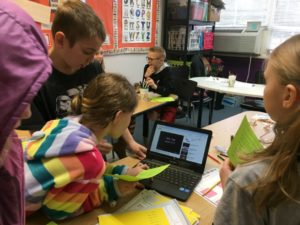 Mathematics w/Laura
Mathematics w/Laura
Perpendicular and Parallel Lines and Line Segments
- Drawing Parallel Line Segments
- Horizontal and Vertical Lines
- Put On Your Thinking Caps
- Review
- Chapter 10 Assessment
Wear something with circles next Thursday, March 14th, for π Day (or Pi Day)
The homework assigned on Friday, March 8th will be due Thursday, March 14th, as there are no classes on Friday, March 15th (Parent-Teacher Conferences)
Puzzles available for extra credit and Friday (Math) Bingo
Remember: MATH …. It’s everywhere
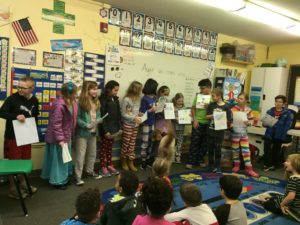 La lectura
La lectura
This week we did a lot of Dr. Seuss reading! (Monday PM was our celebration day.)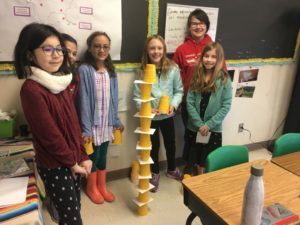
The students also received their Cereal Box book report information sheet. This is due on Friday, March 29th. BEFORE spring break!
Students were given last chances this week to change their book. They all held firm and said they were happy with their picks. Happy reading! I can’t wait to see their boxes!
Ciencias
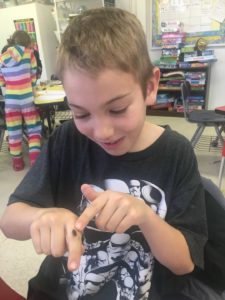
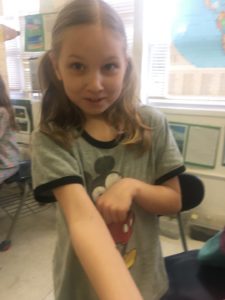
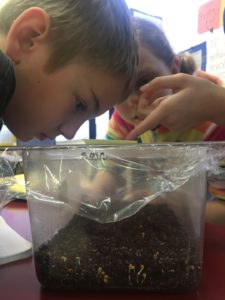
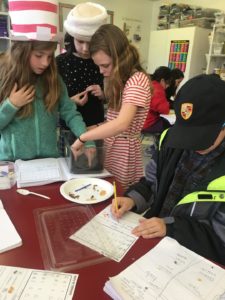
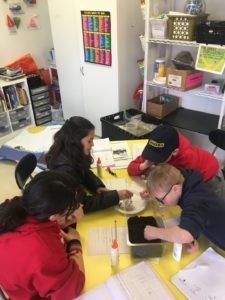
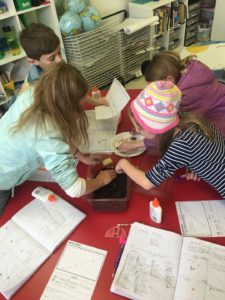
We began our new Science unit: Environments! Students planned and planted 5 seeds in terrariums. They will decide, in their science groups, how to care for these. They are checking them every couple days, recording any changes observed as well as any changes they make (water).
On Friday we also started learning about the insects: isopods and beetles. We are doing an experiment to see which of these would be suited to add to our terrariums.
by Jill & Sarah | Mar 8, 2019 | In The Loop
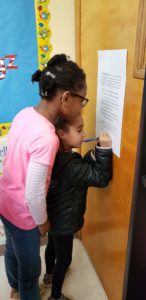 History & Geography
History & Geography
On Monday we had this week we went over our Constitution test and played jeopardy in order to do test corrections. Each student got a copy of the our own Constitution and signed the class copy which is now on display outside of our room door. In our new unit, the War of 1812 We read more about why the war happened and what groups of people and individuals were involved.
Our weekly objectives were to:
• understand the causes of the War of 1812
• identify James Madison, Dolley Madison, and the War Hawks
• Identified Tecumseh and explain how British involvement with the Indians inflamed war sentiment in the West
• Explain the burning of Washington and Dolly Madison’s role in saving government documents
• Understand the story of Francis Scott Key and the “Star Spangled Banner”
 Science
Science
This week we finished our last lesson, Friend and Foe. We worked in our insect journals, seeing if we could answer some of the questions that we had at the beginning of this unit. On Thursday and Friday we did some fun activities to go along with our Insect Unit. Next week students will be working on their speeches and will be presenting them to the class on Thursday March 14. Everyone should plan on bringing their models to school on this day.
Our objectives were to:
• identify ways in which insects can be helpful to people
• identify ways in which insects can be harmful to people
• explain what an entomologist does
•review what we have learned in this unit so far
English Spelling and Writing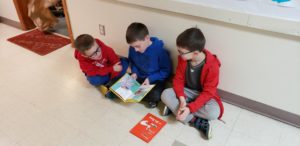
In our journals we used the idiom of the week ” she has egg on her face ” . They wrote about something embarrassing they have experienced or witnessed. The class got their new sort on Monday and took a practice test Friday. Our Word Wall words were: said, saw, sister, small.
La lectura
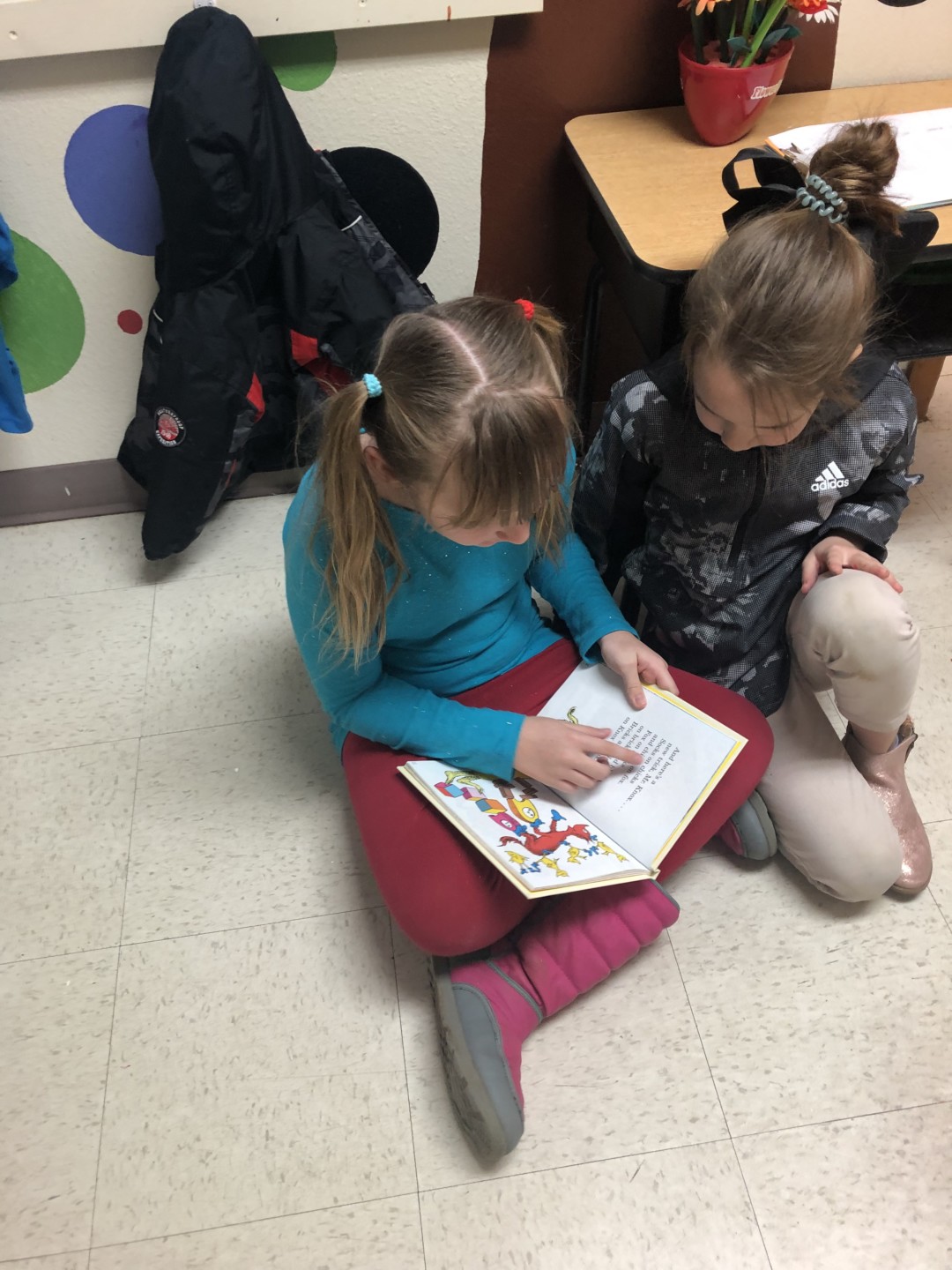
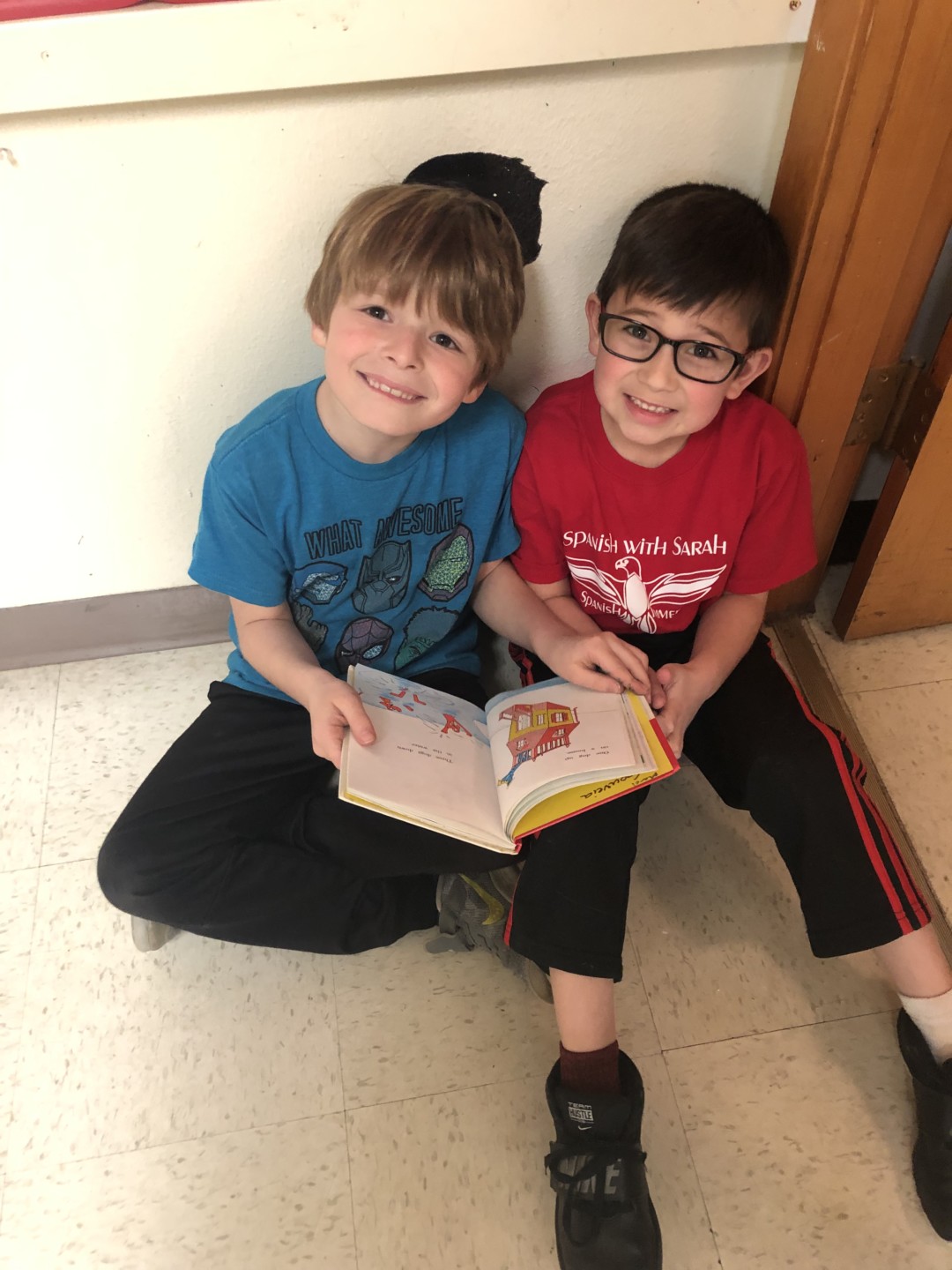
 This week we read three Dr.Seuss books!
This week we read three Dr.Seuss books!
by Sarah Segall | Mar 8, 2019 | In The Loop
La lectura
 We were so lucky to have the older kiddos come read with us and share their writing. This is such an important experience for our kinders, so they can see where all their reading and writing practice will take them.
We were so lucky to have the older kiddos come read with us and share their writing. This is such an important experience for our kinders, so they can see where all their reading and writing practice will take them.
This week we also practiced identifying verbs/ action words. The kiddos are getting SO good at using the word of the day in sentences, making sure to notice the importance of including a verb. We have now passed 1100 tallies for their use of Spanish in the classroom.
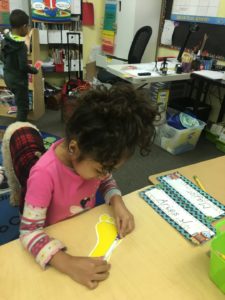
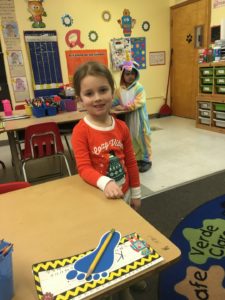
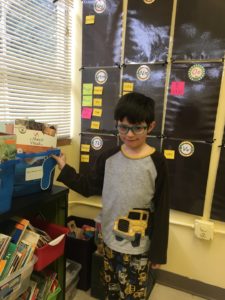
 Las matemáticas
Las matemáticas
We began our measurement unit this week. This is such a fun unit for exploring and expanding on our knowledge. We will be using non-standard units to measure and compare classroom objects.
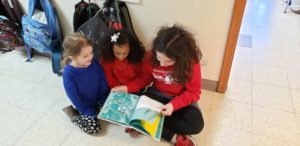 History & Geography
History & Geography
This week in Colonial trades people, we learned about tailors, dressmakers, cobblers, and hatters. On Thursday the class heard the story “The Elves And The Shoe Maker”. We also read several Dr. Seuss books for fun to celebrate Read Across America week.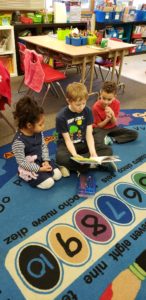
Our weekly objectives were to:
• describe dressmakers, tailors, hatters, and cobblers in a colonial town
• identify, and associate with the appropriate trade, the tools used by the trades people we have learned about
• understand that ready made clothing was not available for sale in colonial shops; clothing was made to order according to the exact measurements of each person.
• explain how trades people in colonial towns saved farming families time and effort
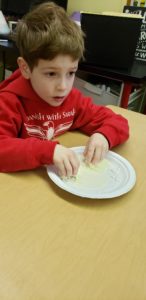 Science
Science
This week in our Taking Care of the Earth domain we learned about the process of recycling and read about composting. The class has been taking left over snack out to our composting bin each day.
Our weekly objectives were to:
• retell important facts and information from our lesson
• identify common recyclable materials, including glass, plastic, aluminum, cardboard, and paper
• understand the process of recycling materials from home to recycling factory
• understand that composting is a type of recycling in which discarded food scraps decay in an outdoor pile or bin and eventually become garden soil.
• sequence what happens to a piece of discarded food from table to compost pile to garden
• identify foods that can be composted
 During this investigation, students investigate the underlying mechanisms of change in population. They learn how organisms inherit traits from their parents and how dominant and recessive alleles interact to produce traits in a population. Some of the big concepts we will see during this investigation are:
During this investigation, students investigate the underlying mechanisms of change in population. They learn how organisms inherit traits from their parents and how dominant and recessive alleles interact to produce traits in a population. Some of the big concepts we will see during this investigation are:
 This week we learned about pi!
This week we learned about pi!
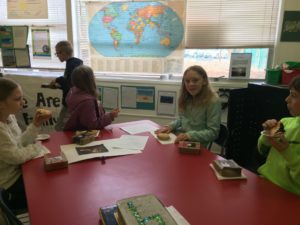
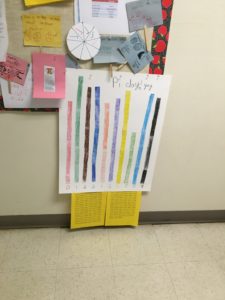
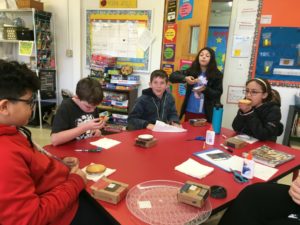











































 This week we read three Dr.Seuss books!
This week we read three Dr.Seuss books!






